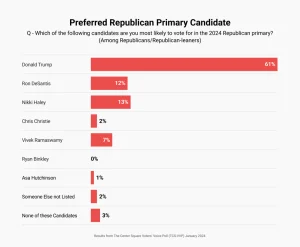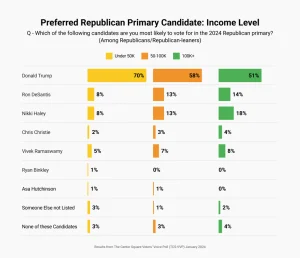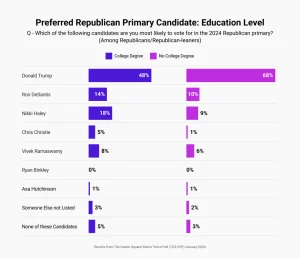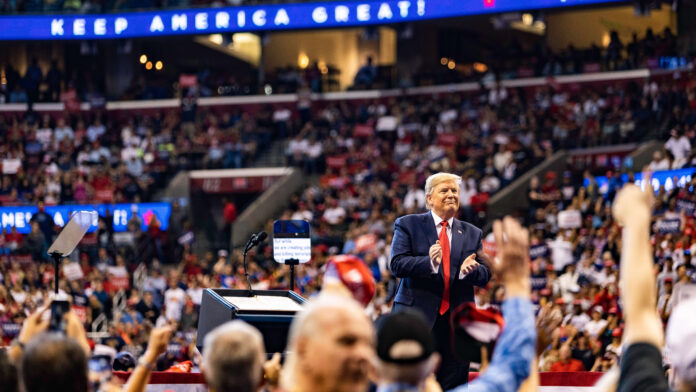(The Center Square) – Former President Donald Trump is far and away the frontrunner for the Republican nomination, but new polling digs into why the former president dominates when it comes to the working class.
The Center Square Voters’ Voice Poll of 2,573 likely voters, conducted in conjunction with Noble Predictive Insights, shows Trump’s support is highest among Republican voters making less than $50,000 and those without a college degree.
The poll found that among all likely Republican and Republican-leaning voters, Trump holds a commanding lead over other GOP candidates. Among those likely voters, 61% picked Trump. Florida Gov. Ron DeSantis trailed with 12%, just behind former U.S. Ambassador to the United Nations Nikki Haley, who had 13%. Next up was businessman Vivek Ramaswamy with 7% and former New Jersey Gov. Chris Christie with 2%. Christie has since suspended his campaign.

Among voters with a household income of less than $50,000, Trump’s support reached 70%. With voters making between $50,000 and $100,000, the former president had 58% support. That figure dropped to 51% for those with household income above $100,000 a year. No matter the income level, Trump had more support than all of his GOP rivals combined.

Voters without a college degree backed Trump with 68% support compared with 48% for those with a college degree.

Trump’s support in the suburbs is softer than in more urban areas, according to the poll. And soft support with college-educated and suburban voters could pose challenges for Trump down the line, said Michael Bitzer, politics department chair at Catawba College in North Carolina.
“With the growing diploma gap between the two parties, if college-degree Republicans are softer in their support of the former president come the general election in November, that may pose a challenge for a candidate that believes he can only win his base and secure an electoral victory,” Bitzer told The Center Square.
Suburban support also could prove critical.
“The other interesting dynamic is among suburban Republican voters compared to urban and especially rural Republican respondents,” Bitzer said. “Compared to almost two-thirds of urban and rural Republicans supporting the former president, the below 60% of suburban voters supporting the former president in the primary may be another warning signal for the general campaign, since nationally so many suburban areas tend to be the swing areas of deciding November’s election.”
Those two soft spots might not matter in the primary contest, but they could be important in November.
“If Republicans in these two categories – college degree holders and suburban voters – are slightly weaker in support for the former president in the primary, my question for these voters is: Will their support increase if he is indeed the party nominee (which, by all accounts, he is on track to become) or do they break partisan ranks and vote Democratic, or simply stay home and avoid the November choice,” he said.
The Center Square Voters’ Voice Poll, conducted from Jan 2-4, found Trump has a four percentage point lead over Biden if the two face off in November.
Trump’s popularity with the working class stems from several factors, said David Byler, chief of research at Noble Predictive Insights, which conducted the poll for The Center Square.
“Trump’s strength with the working class is a product of policy and persona,” he said. “On policy, he moved the GOP away from supply-side economics and toward tougher immigration policies – the working class wing of the GOP wanted that for a long time. He made those moves and built unique credibility with working class voters.”
Trump’s personal trademarks are another factor.
“Persona is also part of the equation,” Byler said. “We let Trump supporters tell us, in their own words, why they backed him. And a decent chunk of his loyalists said he was tough, a straight-shooter and honest in a way that other politicians aren’t. Not every voter thinks this persona is genuine – but his supporters do.”
One Trump loyalist, a white woman older than 65 living in a midwestern state, told pollsters that it came down to dollars and cents.
“We were living so much better when he was President,” she said. “We are now living paycheck to paycheck because inflation is draining all our extra money.”
The poll was conducted in conjunction with Noble Predictive Insights and surveyed 2,573 Americans from Jan. 2-4, about an even number of Republicans and Democrats as well as 266 “true independents,” which are independents who indicated they do not lean toward either party. The poll has a margin of error of about 2%.




